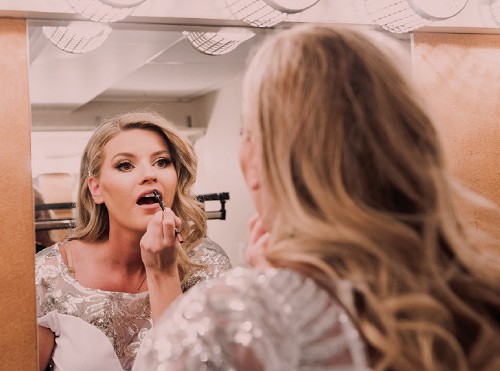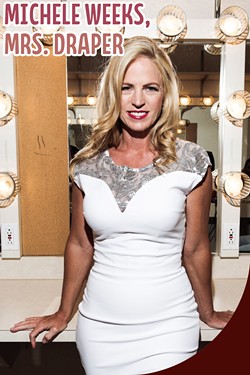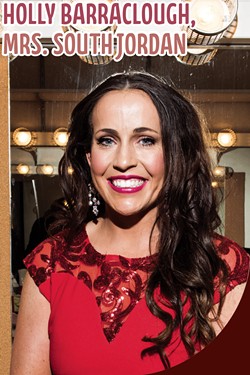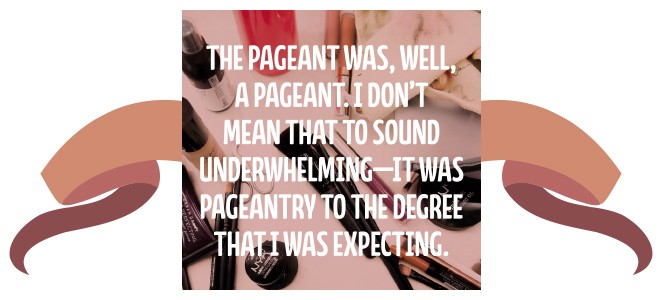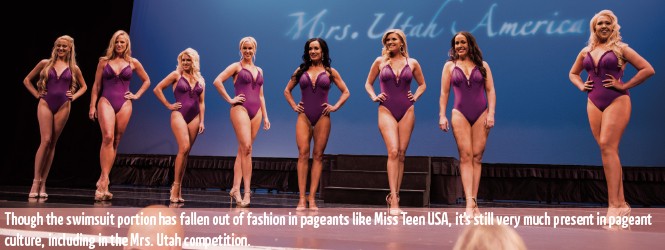
I Will Be Mrs. Utah 2016
8 women compete in a showcase of brains, beauty and world peace.
By Alex Springer @captainspringerAccording to an online quiz that I took a while back, I am indeed a feminist. I think that women have been fighting the good fight ever since they found out what a crappy hand they've been dealt in a country that has been bought and paid for by rich white dudes.
As an internet-certified feminist, the culture behind beauty pageants has always raised certain, unanswerable questions for me. I've watched the Miss America pageant on occasion, and I've actually enjoyed it—though not for the same reasons that I imagine most pageant fans have. I watch it because it appeals to this deep, dark cavern of my pop-culture forebrain that loves watching The Bachelorette while eating Little Caesar's pizza. Perhaps that admission is enough to revoke my web-feminist certification, but hear me out: I can see the obvious indicators that physical appearance is a huge part of pageant culture, and that sucks, but it's also something that the contestants are aware of. It's not a beauty pageant's fault that people are hardwired to pass judgment on someone's looks. I can also see that no one (outside of a few jilted, power-hungry moms, perhaps) is forcing these women to participate in pageants, and it's something that they work hard for. Isn't the ideology behind feminism based on giving women equal opportunity to do whatever the hell they want without fear and prejudice? If so, what's the difference between a woman busting her ass to win a pageant and a woman busting her ass to become a neuroscientist?
I made my mind up about this quandary long ago—but that was before my visit to the Mrs. Utah pageant, which is the state qualifier for the Mrs. America Pageant. It's produced by the same organization behind Miss America, but it differs in that its contestants must be married. There are no scholarships, and its titleholders compete in order to raise awareness for their chosen platform, which is typically based on community service.
Behind the TiaraWhen I stroll into the vacant expanse of Ogden's Egyptian Theatre's gallery over Independence Day weekend, Pageant Director Diane Ritter is perched at a long table directly in front of the stage, dutifully managing the laptop, tablet and cellphone in front of her. It's about three hours before the pageant starts, and she has the determined look of someone who is mentally cataloging a checklist of evolving variables. Given the aura of complete mental focus that is currently surrounding her, I'm surprised when she greets me with a friendly smile and handshake—I've interrupted a woman with this look before, and it did not end well.
Ritter looks like a much more dignified Paula Abdul, and I can tell that her vast repertoire of pageant experience has made her into a formidable event organizer. It's clear she has a zillion things to do, but she's a diehard professional—it would take more than a few minutes with a nerd like me to throw her off of her game. Her company, Bonnie Productions, has overseen the Mrs. Utah and Mrs. Arizona pageants for the past 19 years. "Geographically and demographically, Arizona and Utah are very similar," she says. "Once we had the formula down in Arizona, we took the same formula to Utah, and it's worked. It was a good hunch." Though Mrs. America and Miss America are produced by the same organization, there's something about the Mrs. pageant that has resonated with Ritter. "In the 'Miss' world of pageantry, you're competing for what the pageant can do for you—and that's not a bad thing," she says. "The shift in a Mrs. America Pageant is how contestants can take the title and use it to serve their community."
This makes me pause for a moment. As far as recognition, Mrs. Utah gets a prize package and the opportunity to compete for Mrs. America. But the reason they're competing at all is because each contestant has a community-oriented platform, and gaining the title of Mrs. Utah, Mrs. America or even Mrs. World would help them promote it. I quickly remind myself that there must be some kind of catch, shake myself out of my momentary trance and move on to the tough questions.
There are many critics of pageants in general, who raise some valid points about our country's obsession with physical appearance. I'm particularly fond of Last Week Tonight's September 2014 assessment of the Miss America Pageant, in which host John Oliver determines that, despite their inaccurate dollar amounts, the Miss America Organization does in fact provide the most scholarships exclusively for women than any other organization in the world, but that those scholarships are won with minimal focus on actual academic skills.
It's a viewpoint that Ritter is familiar with, and she wasted no time in firing back. "My first question to critics would be to ask them if they have ever participated in a pageant," she says. "Yes, it is a beauty pageant and it can seem superficial, but, speaking from the 'Mrs.' perspective, it takes a lot of courage for these women to stand on stage and be judged." My first impulse is to follow up with something like, "Yeah, but they get a lot of money if they win. You can get people to eat cockroaches if you promise them money," when I remember that Mrs. Utah contestants aren't competing for that kind of compensation. How many people would eat bugs to raise mental illness awareness or increase the presence of women in politics? "It's not a one-dimensional activity, and I think that's what people don't see. Take the time and find out what these titleholders are up to, and you'll see," Ritter says.
Luckily, I didn't have to go far to find out what Natalie Murray, Mrs. Utah 2015, has been up to—she took some time out of her busy pre-pageant schedule to discuss her year. Her platform was based on emergency preparedness, which gave her the opportunity to partner with the American Red Cross and travel the state promoting preparedness strategies and resources available to Utahns. "Just last week, I had an opportunity to hand out awards to military veterans for the Wheelchair Games. Of the events I've done, that was the most meaningful," Murray says. "It really touched my heart to see these veterans that have sacrificed so much."
Before taking the title last year, Murray was no stranger to beauty pageants. As a teenager, she competed within the Miss America Organization. "I really liked the self-development that came along with that," she says. "When I got married and had kids, I didn't know that there were pageants for married women. When I found out there was, I was excited because I needed something that I liked to do that was just for me." She had always been involved with community service activities, and pageants became another avenue to pursue that passion. Aside from her role as Mrs. Utah, Murray is also a full-time mother, and is pursuing a bachelor's degree in exercise and sports science. Even with all of these responsibilities in her life, passing the title on this year is bittersweet for Murray. "On one side, I'm ready to be done," she says, "but it's also very sad."
While it's obvious that Murray will always have fond memories of her Mrs. Utah reign, it's also obvious that she would gladly hand the crown over to any of the accomplished women who have come out to compete. By the time Murray shakes my hand and rushes backstage to put the finishing touches on her show-opening dance number, I notice the three smiling women who are taking their seats next to me.
A Cosplayer, a Politician and a Reporter Walk into a Pageant...
After Ritter ensures that her contestants are well-taken care of, she promptly returns to her pre-show responsibilities. There are eight contestants total, some of whom have traveled from the faraway lands of Ivins and Stansbury Park to be here tonight. Their platforms vary widely, thought all of them benefit the community in some way. Most of the lineup is blond and all of them are caucasian—a combo that doesn't really help dispel the stereotype of your typical beauty pageant contestant. Regardless, some impressive women are competing tonight, and three of them agreed to chat with me even though they were right in the middle of their hair and makeup routine.
Ali Smith is a dead ringer for Elsa from Disney's Frozen, which is fitting considering her involvement with HEROIC (Heroes Engaging Real Organizations in Charity), a local group of cosplayers (aka "cause-players") that contribute a superhero flair to local charity events. Smith is also involved in the Legacy Initiative, an organization that is currently constructing HOPE (Helping Other People Evolve) lockers that Salt Lake's homeless community can use to store their belongings.
Smith is representing Davis County in the pageant, and she's the newest addition to the group. "About two weeks ago, I did the Mrs. Utah United States Pageant. The director's sister suggested this pageant to further promote my charity involvement," Smith says. "I just met the Mrs. Utah America girls yesterday, and we've already built a strong sisterhood together." Smith's platform is focused on promoting NAMI (National Alliance on Mental Illness) Utah. She's a strong advocate of raising awareness for providing help to those with mental illnesses, and she hopes to use the title of Mrs. Utah to take that advocacy further.
Discussing pre-pageant preparation and the art of friendly competition with Smith quickly made me realize that the stories about cattiness and venom behind the scenes of a beauty pageant aren't the norm here—these women genuinely seem to like each other. Despite the fact that it is a competition and there can be only one winner, Smith's attitude toward competing is straightforward and accepting of her competitors. "There's no reason to be mean and competitive against the other girls because they've prepped as much as you have," she says. "When you get here, and you're performing on stage, that is your moment."
When she's not competing in pageants, Michele Weeks is a councilmember for the city of Draper. For me, these two realities did not quite compute because I didn't know that politicians were allowed to have fun. She won the title of Mrs. Utah in 2013, which she used to raise awareness for ADHD, and this year she's hoping to start a dialogue about the disparity between women and men in politics. "As an elected official and a woman, the gap is larger than I imagined," she says, "Right now, women only represent 16 percent of our state representatives, and it's very low compared to the rest of the nation."
She's also a member of Pet Partners Utah, an organization that pairs therapy animals to those in need, and she was behind the organization of the first Wasatch Front Teacher Appreciation Day, which gave 900 local educators a night out at the Living Planet Aquarium. "Education is very important to me, and we were glad to show our appreciation to our teachers," Weeks says.
Despite the fact that the pageant is only a few hours away, my conversation with Weeks drifts by like a breezy summer afternoon—there are no pre-show jitters to speak of. Perhaps this is because she's a veteran of the pageant circuit, and she simply enjoys the process. "As a mom of six and grandmother of two, I don't always have time to spend on me. Pageants are a time for me to reflect on where I want to go in my life, and spend some quality time enjoying being a woman," she says. Weeks also sees pageants as unique opportunities to meet equally dynamic women who are passionate about their communities. "I'll take a pageant over a political campaign any day," she says. "What's really great about each of these contestants is their depth. Sometimes you don't realize how philosophical and passionate these women are about their community."
If you listen to the traffic reports on KSL Channel 5 from 6-9 a.m., chances are you've heard Holly Barraclough breaking down the morning grind. She's also in charge of reporting on KSL's Teacher Feature and Utah Gives Back segments, and is in her fourth year as a wish-granter for the Utah chapter of the Make-A-Wish Foundation.
Like the other contestants I have met, Barraclough has a very pragmatic approach to the night's events and pageants in general. "I'm already doing charity work, and regardless of the title, I'll continue to do it," she says firmly. "The title would make my voice amplified, and it's a perfect vehicle to get you places where you couldn't go normally."
As a past Mrs. Utah America contestant, Barraclough is quick to cite the pageant as a learning opportunity for everyone who competes. "I would encourage all women to do a pageant. It teaches women confidence and poise which is important for a career. You never lose a pageant. You either win or you learn," she says.
After my conversations with these three contestants, I feel like I'm starting to get it. A pageant like Mrs. Utah America comprises elements of competition, beautification and a chance to be active in one's community, so it's no surprise that it attracts women like Smith, Weeks and Barraclough. All three are ambitious in their own charitable endeavors, so why wouldn't they check out an avenue that lets them pursue that ambition while taking the time to enjoy themselves as women? I may not have talked with all of the contestants, but I'm sure that they're as lovely and diverse as these three. Regardless, I find myself rooting for Mrs. Davis County, Mrs. Draper and Mrs. South Jordan—it takes some serious kindness to interrupt a pre-pageant hair and makeup session to talk to the likes of me.
The Pageant Experience
Back in college, I had a job at ArtTix. It was a pretty low-key gig—I got to read a lot, and placing ticket orders over the phone wasn't overly strenuous. Occasionally, we had a big show like Wicked or Jerry Seinfeld come through, appropriately kicking our asses into high gear, but nothing filled the ticket office with as much dread as pageant season. I heard horror stories of huge ticket orders, monstrous pageant moms and horrendous encounters at the will call window when someone realized that they purchased tickets for the wrong night. By the time pageant season rolled around during my tenure in the ticket office, I thought I could handle it. Let's just say I was wrong and leave it at that. Suffice to say, my own experience with local pageants hasn't been extremely positive, but that was a long time ago. And tonight, I have the advantage of not working in the ticket booth.
Based on that one experience, I was surprised to see that the gallery wasn't filling up with legions of relatives from all over the country, each clan fiercely bearing their ancestral coats of arms, which was what I remembered from my experience with Miss Utah. Sure, there were small pockets of impeccably dressed and pleasantly vocal supporters of the contestants, but not quite the crowd that I was expecting. Diane had explained that the numbers for Mrs. Utah America were traditionally less than those of Miss Utah, combined with the fact that it was a holiday weekend, but still. I suppose contestants in Mrs. Utah only need the support of those who mean the most to them, and that tends to be a small crowd for all of us.
The pageant was, well, a pageant. I don't mean that to sound underwhelming—it was pageantry to the degree that I was expecting. Diane's many years of production expertise was on display, the contestants were graceful throughout, and it was evident that each of them cared deeply for their chosen platform. Natalie Murray and her two daughters kicked off the show with a properly adorable dance number, and the retrospective that chronicled her year as Mrs. Utah effectively illustrated all of the good she did during her tenure.
It was the judging process that didn't really gel with me. I only spoke with three contestants, and spending 10 minutes with each of them was enough for me to recognize their merit as human beings. According to the Mrs. Utah America guidelines, half of the contestants' scores are determined by a personal interview with the judges—this takes place offstage, however. The other half of their scores are split between their performances in the swimwear and eveningwear segments. I attempted to divine the criteria that the judges used to make their decisions because I've never been quite sure how they decide that one woman's performance was better than another's. What does bad poise look like? Is it possible to score a 6 out of 10 on grace? The onstage question and answer was a little bit less challenging to read into—it's pretty easy to tell who bombed that one. I didn't get the opportunity to chat with any of the judges, but I did learn that the panel consisted of two former titleholders—one of whom was Starla Stanley, an Army veteran who won Mrs. World in 1999—and a Cache County sheriff's deputy. I absently wondered what qualified him to be the judge of a beauty pageant, so I looked it up. Based on the information that I found online, it doesn't look like there is any steadfast criteria for the judging process, which means that I'm probably qualified to judge a beauty pageant. I get having past contestants come back as judges—if a woman can take home the title of Mrs. World, I'd trust her opinion on what constitutes a good performance. If you're not a past contestant, however, it looks like all you really need to judge a beauty pageant are a pair of eyes and an opinion regarding what is and is not beautiful.
After the first wave of judgment, the contestants are divided in half. The four finalists then proceed to another Q&A session, which precedes the vote and announcement of the new Mrs. Utah.
Holly Barraclough was third runner-up, but Ali and Michele didn't make the finals. The finalists' second round of questions were supposed to be the tough ones, but I personally didn't find them to be totally up to snuff. Two contestants were asked essentially the same question—there's not much difference between "define beauty" and "define the 'it' factor." Regardless of the apparent lack of effort in devising these questions, the contestants offered up eloquent replies, demonstrating their ability to make the most of what was given to them. Since I was already confused by the judging process, this part of the pageant made it more difficult to predict who was going to take home the title. In the end, it was Monica Bailey, Mrs. Salt Lake County. She was a bit of a dark horse at the beginning, but her striking appearance in a gorgeous red gown as she offered a mic-drop-worthy answer to a fairly contrived question was enough to solidify her regality. While I was happy for her, I couldn't help but feel a little bad for the three contestants that I got to know—even though all three of them would tell me to man the hell up.
Given the hectic schedule of the newly minted Mrs. Utah, I was unable to get her spin on the pageant experience, but it wasn't too hard to see that she was ecstatic. Bailey hopes to use her title to work with Prevent Child Abuse Utah. She also plans to start a YouTube channel as a way to connect with and support victims of emotional abuse. And, if she's anything like the contestants that I met, she also saw the value in getting to spend the weekend with some truly amazing women—all in all, not a bad night for Mrs. Salt Lake County.
Post Pageant Reflection
On my long drive back to Salt Lake, glitz and sequins in my rearview mirror, I played the last few hours back in my head. While I can't say that I'm officially sold on the idea of beauty pageants, my perspective on them has been sufficiently altered. Much like the physical appearance of a person, a pageant only represents a small part of those who are involved. The problem lies in the fact that we're still living in a society that places an overabundance of value on physical appearances, so most people's knees tend to jerk in that direction when offering up their criticisms. A deeper look into the actual stories, causes and ambitions of the contestants offers a more accurate perspective of the women who compete in pageants. There's a small part of me that thinks clever women use beauty pageants as a way to subvert our societal obsession with beauty as a springboard for whatever cause that they're striving to promote. But after visiting with some local contestants, a bigger part of me thinks that most pageant competitors are just looking for a way to do something nice while having a little fun in the process.
Regardless of the conversation du jour that we could have about the ills of pageant culture, after taking the time to look beneath the obvious and focus on the actual people within this community, I'd say it's time to give these ladies a break. Competing in a pageant might not be every woman's thing—and it doesn't have to be. But to those who are working hard toward this goal, it's safe to say that they're worthy of respect; it's just a matter of turning our criticisms on ourselves, looking past the contestants' physical appearance, and trying to find out who they are as people.
In the end, it reminded me of an experience that I had while waiting in line for the Firefly reunion at San Diego Comic-Con. My wife and I happened to be standing in front of a fairly vocal member of the geek community, and someone mentioned the Twilight fan culture. In true comic-book-guy fashion, this dude behind us snorted in derision. He launched into a tirade about how Twilight is lame, and how he couldn't understand why people loved that story enough to dress up like vampires in the middle of the summer. The irony of this situation? Homeboy was dressed up like Han Solo. He loved Star Wars to the point of dressing up as an intergalactic smuggler, yet he couldn't understand why another story would be so important to anyone else, because it sure as hell wasn't important to him. Let us all learn from the folly of Han Solo dude, and just let people find whatever it is that makes them happy. Then leave them the fuck alone. How's that for a Miss Congeniality answer? CW
More by Alex Springer
-
Restaurant Review: Noodlehead is a Love Letter to Ramen Bars
The creative team behind Provisions dips into noodle wizardry with this Millcreek gem.
- Apr 17, 2024
-
Restaurant Review: Upscale Dining with a Sense of Humor at Roux
This new downtown restaurant mixes neighborhood comfort with a metropolitan menu.
- Apr 10, 2024
-
Restaurant Review: Huckleberry Grill Reinvents Fast-Casual
Get a taste of some local home cookin' at this new Salt Lake restaurant.
- Apr 3, 2024
- More »
Latest in Cover Story
Readers also liked…
-
Forget the family pedigree—Robert F. Kennedy Jr should not be the next president of the United States
Trojan Horse
- Jun 21, 2023
-
Women decry harassment and toxic culture at St. George auto dealership
Men at Work
- Oct 11, 2023


